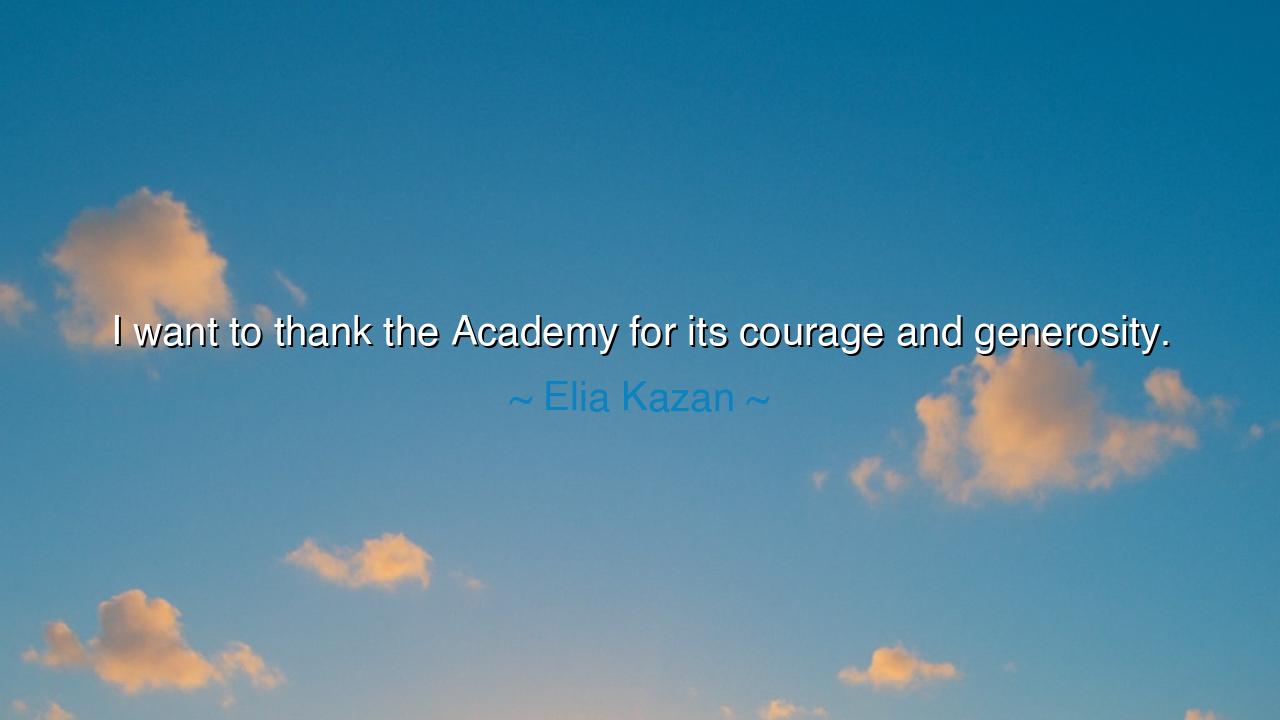
I want to thank the Academy for its courage and generosity.






“I want to thank the Academy for its courage and generosity.”
Thus spoke Elia Kazan, one of the most celebrated and controversial directors in the history of American cinema. His words, spoken in 1999 as he received an Honorary Academy Award, echo with a tension that is both humble and defiant, both grateful and haunting. To understand this simple sentence, one must look beyond its surface—to the deep undercurrents of history, forgiveness, and moral complexity that shaped it. For in that brief moment, Kazan was not merely accepting an honor—he was standing at the crossroads of art and conscience, of glory and guilt, of the enduring struggle between truth and redemption.
The origin of this quote lies in one of Hollywood’s most turbulent chapters: the McCarthy era, when fear and suspicion ruled, and many were called before the House Un-American Activities Committee to testify about alleged ties to communism. In 1952, Elia Kazan—then at the height of his artistic power—chose to name names, identifying former colleagues as members of the Communist Party. His decision, whether seen as loyalty to country or betrayal of friends, left a scar upon his legacy that time itself could not heal. For decades, he was both revered as a master of film and reviled as a man who had bowed to fear. Thus, when the Academy chose to honor him nearly half a century later, it did so amid protest and applause alike. The air in the hall was thick with history.
When Kazan said, “I want to thank the Academy for its courage and generosity,” he spoke not as a triumphant victor, but as a man aware of the weight of his past. His words were a mirror turned toward both himself and his audience. The “courage” he named was the courage of the Academy to look beyond condemnation—to acknowledge the artist even while the man remained contested. The “generosity” he praised was the willingness to extend grace in a world that so easily clings to bitterness. In those few words, Kazan offered neither apology nor defiance, but an acknowledgment that forgiveness, when granted, demands strength equal to the original offense.
It is a truth as old as humankind: forgiveness requires courage. To forgive is to rise above vengeance, to see the whole of a person rather than the worst of their actions. History, too, records such acts of moral generosity. Consider Nelson Mandela, who, after decades of imprisonment, emerged not to curse his captors but to call for unity. Like Kazan’s Academy, Mandela understood that healing requires not the erasure of wounds but the courage to face them without hate. The one who forgives does not excuse wrongdoing—they transform it, turning pain into wisdom and resentment into renewal.
And yet, Kazan’s quote also invites reflection on the complex nature of courage itself. Was the Academy courageous for honoring him—or were they reopening old wounds for art’s sake? Was Kazan courageous for testifying in 1952, believing he was defending his ideals, or cowardly for betraying trust? These questions have no single answer. They are the eternal dilemmas of the human soul, torn between principle and survival. What makes Kazan’s words powerful is that they stand within this ambiguity—recognizing that courage and generosity often dwell not in the absence of conflict, but in its reconciliation.
For those who hear these words today, the lesson is clear: do not judge too quickly the heart of another, for every human carries the burden of decisions made in fear or faith. But also, do not shy from the hard work of forgiveness—whether seeking it or granting it. Forgiveness does not cleanse the past, but it frees the present. It is a gift both to the giver and the receiver, and it allows life, art, and community to move forward rather than remain chained to the ashes of what has been.
So, my child, when you stand before the choices of your own life—when pride and humility wrestle within you—remember the paradox of Elia Kazan’s words. To thank others for their courage and generosity is to acknowledge that no one stands alone in redemption. Honor those who show mercy, and strive to be among them. For in a world where judgment comes swiftly and compassion grows rare, the greatest bravery is to forgive, and the highest generosity is to understand.
Thus, let this be your teaching: history will remember the artist, but eternity will remember the heart. Speak truthfully, act with conscience, and when others falter, meet them not with scorn but with the courage and generosity that turn even wounds into wisdom.






AAdministratorAdministrator
Welcome, honored guests. Please leave a comment, we will respond soon